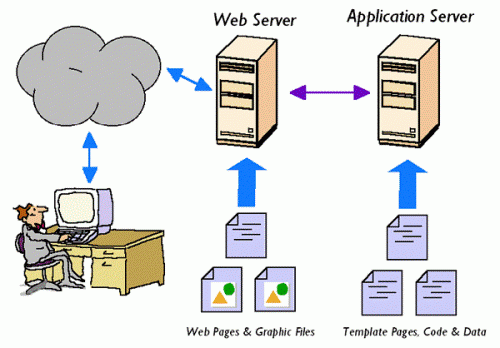In this article, we’ll find out about how a web server is different from an application server.
Summary Table
| Web Server | Application Server |
| Normally stores webpages | Usually stores applications |
| Mainly handles HTTP requests for webpages | Can deal with several protocols |
| Contains static webpages | Features dynamic content |
Definitions

A web server is a computer that retrieves stored web pages in response to HTTP requests from client computers. Let’s say you’re on a computer to check your friend’s photos on Facebook. Your computer sends a request via HTTP to Facebook’s web servers where all the web pages are stored, then it sends the page back to your computer also using HTTP. These pages are usually in HTML format, and they most likely contain images and texts.
A web server can also be the actual software that processes the HTTP requests. It is composed of several components that control access to hosted web pages. One of these components is the HTTP server, a type of software that reads web addresses and HTTP requests.
The use of web servers is not just limited to serving web pages to your computer. Web servers are also embedded in routers, printers, and webcams connected via a local network. Here, they are used to monitor and control all the devices connected to the local network without the need for additional software installed on the client computer.
An application server is a software engine accessed by client computers and sometimes by web servers as well. It’s a computer that you’ll most probably see in an office network where every device connected to that network can run software applications on the same machine. That’s the main function of an application server – to process and provide clients and other applications access to its business and functional logic. Software developers rely heavily on this feature by using protocols, definitions, and other software building tools already defined on the application server. As far as web applications go, application servers help create dynamic pages in conjunction with web servers. Other functions of application servers include data redundancy (to secure data), load balancing, high availability, user management, and a unified management interface.
Web Server vs Application Server
A web server is basically a library of web pages where a device gains access via HTTP requests. These requests are processed and sent by the web server back to the device. An application server’s basic function is to allow applications to access its high level, computing-intensive functions and services. Other applications and web servers can access an application server as well.
Web servers usually handle HTTP protocols. Application servers, on the other hand, deal with several protocols, one of which is HTTP. A website that contains static and dynamic content has web servers processing static content alongside application servers pulling content dynamically.






